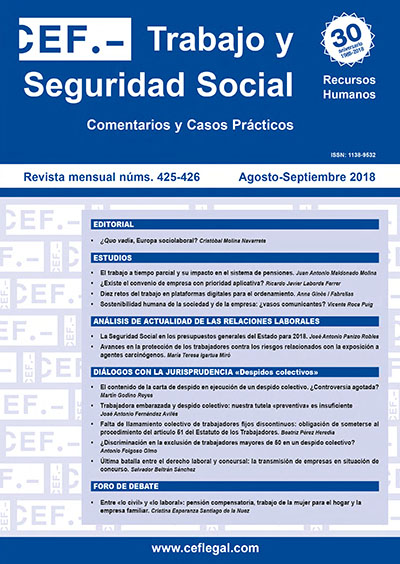Ten challenges of platform work for the Spanish legal-labor system
DOI:
https://doi.org/10.51302/rtss.2018.1540Keywords:
sharing economy, platform work, employee, self-employed workerAbstract
New technologies have modified the ways of providing services. In the context of the sharing economy, numerous digital platforms have appeared that, through crowdsourcing and on-demand hiring, have modified the way of providing services. Jobs traditionally developed by workers have been replaced by very short-term work carried out by –formally considered– self-employed workers, causing an escape from the Labor Law. In this context, the purpose of this article is to analyze the ten challenges that platform work poses for the Spanish legal-labor system. Ten challenges related to the need to analyze the business model used by digital platforms and their impact on labor relations, determine the fit of new forms of work in the Spanish legal-labor system and rethink the boundaries of Labor Law to ensure that its goal, set in the nineteenth century, is still applicable in the twenty-first century.
Downloads
References
AA. VV. (2013). The rise of the sharing economy. www.economist.com (09-03-2013). Recuperado de https://www.economist.com/leaders/2013/03/09/the-rise-of-the-sharing-economy (consultado el 28 de marzo de 2018).
Adams, A., Freedland, M. y Prassl, J. (2015) The «zero-hours contract»: regulating casual work, or legitimating precarity? Oxford Legal Studies Research Paper, 11, 1-21.
Agote, R. (2017). On demand economy: 10 claves de entendimiento laboral. IUSLabor, 1, 1-18.
Alarcón Caracuel, M. R. (1986). La ajenidad en el mercado: un criterio definitorio del contrato de trabajo. Revista Española de Derecho del Trabajo, 28, 495-544.
Aloisi, A. (2015). The rising of on-demand work, a case study research on a set of online platforms and apps. SSRN Electronic Journal, 1-38.
Angelopoulos, E. y Boumpoucheropoulos, P. (2016). Working time and flexibility in Greece. Comparative Labor Law Dossier. Working time and flexibility. IUSLabor, 1, 23-35.
Bergvall-Kåreborn, B. y Howcroft, D. (2014). Amazon Mechanical Turk and the commodification of labor. New Technology, Work and Employment, 29(3), 213-223.
Botsman, R. (2010). The case of collaborative consumption. TedxSydney (05-2010). Recuperado de https://www.ted.com/talks/rachel_botsman_the_case_for_collaborative_consumption (consultado el 28 de marzo de 2018).
Botsman, R. (2015). Defining the sharing economy: what is collaborative consumption-and what isn’t? fastcompany.com (27-05-2015). Recuperado de https://www.fastcompany.com/3046119/defining-the-sharing-economy-what-is-collaborative-consumption-and-what-isnt (consultado el 28 de marzo de 2018).
Butler, M. (2016). Working time and flexibility in the United Kingdom. Comparative Labor Law Dossier. Working time and flexibility. IUSLabor, 1, 66-74.
Dagnino, E. (2015). Uber law: perspectiva jurídico-laboral de la sharing/on-demand economy. Revista Internacional y Comparada de Relaciones Laborales y Derecho del Empleo, 3(3), 1-31.
De Stefano, V. (2016). The rise of the «just-in-time workforce»: on-demand work, crowdwork and labour protection in the «gig-economy». Conditions of Work and Employment Series, ILO, 71, 1-43.
Del Rey Guanter, S. y Martínez Fons, D. (2013). Artículo 1. Ámbito de aplicación. En S. del Rey Guanter (Dir.), Estatuto de los Trabajadores. Comentado y con jurisprudencia (3.ª ed., pp. 44-53). Madrid: La Ley.
Ferrante, V. (2016). Working time and flexibility in Italy. Comparative Labor Law Dossier. Working time and flexibility. IUSLabor, 1, 36-43.
Ginès i Fabrellas, A. (2016). Crowdsourcing sites y nuevas formas de trabajo. El caso de Amazon Mechanical Turk. Revista de Derecho Social y Empresa, 6, pp. 66-85.
Ginès i Fabrellas, A. (2017). Crowdsourcing y contratación on-demand: ¿una modalidad lícita de externalización productiva en el nuevo entorno digital? En L. Mella Méndez y L. Serrani (Eds.), Los actuales cambios sociales y laborales: nuevos retos para el mundo del Trabajo. Libro 1: Cambios tecnológicos y nuevos retos para el mundo del trabajo (Portugal, España, Colombia, Italia, Francia) (pp. 185-207). Berna: Peter Lang.
Ginès i Fabrellas, A. y Gálvez Duran, S. (2016). Sharing economy vs. uber economy y las fronteras del Derecho del Trabajo: la (des)protección de los trabajadores en el nuevo entorno digital. InDret, 1, 1-44.
Hern, A. (2015). Why the term «sharing economy» needs to die. theguardian.com (05-10-2015). Recuperado de https://www.theguardian.com/technology/2015/oct/05/why-the-term-sharing-economy-needs-to-die (consultado el 28 de marzo de 2018).
Hill, S. (2015). The future of work in the uber economy. Creating a safety net in a multi-employer world. bostonreview.net (22-07-2015). Recuperado de http://bostonreview.net/us/steven-hill-uber-economy-individual-security-accounts (consultado el 28 de marzo de 2018).
Howe, J. (2006). The rise of crowdsourcing. wired.com (01-06-2006). Recuperado de https://www.wired.com/2006/06/crowds/ (consultado el 28 de marzo de 2018).
Mercader Uguina, J. R. (2017). El futuro del trabajo en la era de la digitalización y la robótica. Valencia: Tirant lo Blanch.
Molina, J. (2015). Los retos laborales de la «on-demand economy»: el caso Uber. (28-10-2015). Recuperado de https://blog.cuatrecasas.com/laboral/los-retos-laborales-de-la-on-demand-economy-el-caso-uber/ (consultado el 28 de marzo de 2018).
Prassl, J. y Risak, M. (2016). Uber, TaskRabbit & Co: platforms as employers? Rethinking the legal analysis of crowdwork. Comparative Labor Law Policy Journal, 37(3), 619-652.
Rodríguez-Piñero Royo, M. (2017). El jurista del trabajo frente a la economía colaborativa. En M. Rodríguez-Piñero Royo y M. Hernández-Bejarano (Dirs.), Economía colaborativa y trabajo en plataforma: realidades y desafíos (pp. 187-221). Albacete: Bomarzo.
Rogers, B. (2015). The social costs of Uber. The University of Chicago Law Review Dialogue, 82, 85-102.
Russell, T. (s. f.). A guide to UK employment law. Recuperado de http://www.tim-russell.co.uk/upimages/employment%20guide.pdf (consultado el 28 de marzo de 2018).
Sánchez Torres, E. (2014). Consideraciones a la nueva regulación de la ordenación del tiempo de trabajo en el contrato a tiempo parcial: de cómo la realidad puede dinamitar las estructuras legales. IUSLabor, 1, 1-12.
Srnicek, N. (2017). Platform capitalism. Reino Unido: Polity Press.
Todolí Signes, A. (2015). El impacto de la «uber economy» en las relaciones laborales: los efectos de las plataformas virtuales en el contrato de trabajo. IUSLabor, 3, 1-25.
Todolí Signes, A. (2017). Nuevos indicios de laboralidad como resultado de las nuevas empresas digitales. En M. Rodríguez-Piñero Royo y M. Hernández-Bejarano (Dirs.), Economía colaborativa y trabajo en plataforma: realidades y desafíos (pp. 223-241). Albacete: Bomarzo.



















